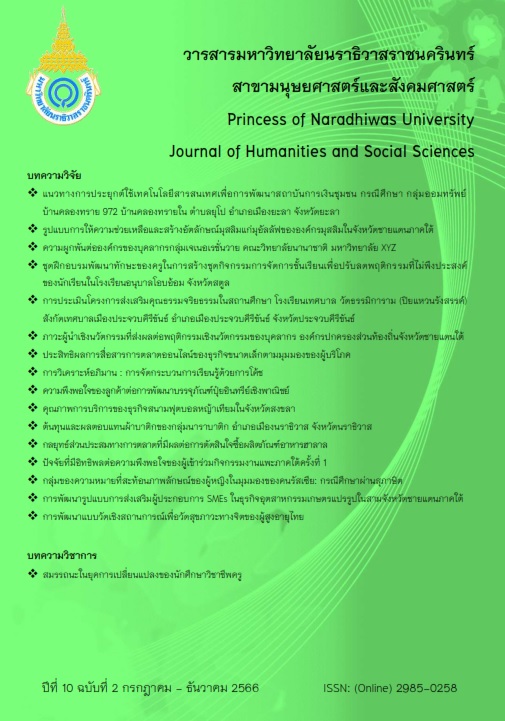The Meta-Analysis of Coaching Learning Process Management
Main Article Content
Abstract
The purpose of this research was to analyze the basic characteristics of research on coaching learning process management and to analyze the basic characteristics of the research that affect the effect size of research on coaching learning process management. Research papers on learning process management with coaching during the year 2012-2020 were analyzed. The research tools consisted of research data extraction form and research quality assessment form, data analysis statistic such as percentage, mean, standard deviation, effect size: d, t-test, F-test and multiple regression analysis.
According to the document analysis, the quality of several research papers on coaching learning process management in public universities, Early Childhood Department was at a good level. The results of the analysis of variance on the effect size revealed that there were 12 variables research-characteristics that made the effect size different at the statistical significance level of 0.05, 7 variables for the initial characteristics of the research, 1 variable for the content of the research, 3 variables for the methodology of the research and 1 variable for research results. The results of the multiple regression analysis revealed that the 4 variables that affected the effect size were ordered from the greatest to the least, the field of research is early childhood, research field not specified, mixed research type and number of pages excluding appendices. The body of knowledge of the coaching learning process management can be organized in a variety of formats at all level of education while the coaching process, learning materials and the coaching period is adjusted according to the situation.
Article Details

This work is licensed under a Creative Commons Attribution-NonCommercial-NoDerivatives 4.0 International License.
References
ขวัญจิต สงวนโรจน์. (2559). การสังเคราะห์งานวิจัยที่เกี่ยวของกับการประกันคุณภาพการศึกษาด้วยเทคนิคการวิเคราะห์เนื้อหาและการวิเคราะห์อภิมาน (วิทยานิพนธ์ปริญญาครุศาสตร มหาบัณฑิต). มหาวิทยาลัยราชภัฎธนบุรี, กรุงเทพฯ.
เจือจันทร์ จงสถิตอยู่. (2558). รายงานการสังเคราะห์ผลการดำเนินงานชุดโครงการวิจัยกระบวนการพัฒนาครูด้วยระบบหนุนนำต่อเนื่อง (Teacher Coaching). สำนักงานกองทุนสนับสนุนการวิจัย (สกว.).
ณรงค์วัฒน์ มิ่งมิตร. (2560). การสังเคราะห์งานวิจัยที่เกี่ยวกับผลสัมฤทธิ์ทางการเรียนกลุ่มสาระการเรียนรู้คณิตศาสตร์ระดับประถมศึกษาปีการศึกษา 2552-2558. วารสารสารสนเทศ, 16(1), 151-161.
นาถยา พรมประศรี, มารศรี กลางประพันธ์, และสมเกียรติ พละจิตต์. (2565). การสังเคราะห์งานวิจัยเกี่ยวกับรูปแบบการเรียนการสอนที่ส่งผลต่อผลสัมฤทธิ์ทางการเรียนวิชาภาษาอังกฤษโดยการวิเคราะห์อภิมาน. วารสารบัณฑิตศึกษา มหาวิทยาลัยราชภัฏสกลนคร, 19(85), 12-23.
ปราณี พิพัฒน์สถิตกุล. (2556). การสังเคราะห์งานวิจัยด้านนวัตกรรมเพื่อพัฒนาทักษะการคิดวิเคราะห์กลุ่มสาระภาษาไทยของนักเรียนระดับการศึกษาขั้นพื้นฐาน:การวิเคราะห์อภิมาน(ปริญญานิพนธ์การศึกษามหาบัณฑิต). มหาวิทยาลัยศรีนครินทรวิโรฒ, กรุงเทพฯ.
พรพิมล ประดิษฐ์. (2558). การวิเคราะห์อภิมานงานวิจัยปัจจัยที่มีความสัมพันธ์กับพฤติกรรมการป้องกันโรคไข้มาลาเรียตามทฤษฎีแบบแผนความเชื่อด้านสุขภาพ และทฤษฎีแรงสนับสนุนทางสังคม (วิทยานิพนธ์สาธารณสุขศาสตรมหาบัณฑิต). มหาวิทยาลัยธรรมศาสตร์, กรุงเทพฯ.
มยุรี เจริญศิริ. (2558). การศึกษารูปแบบการพัฒนาสมรรถนะการโค้ชและการจัดการเรียนรู้ของครู ที่ส่งเสริมให้ผู้เรียนเกิดทักษะการคิดแก้ปัญหา. วารสารศึกษาศาสตร์ มหาวิทยาลัยศิลปากร, 13(1), 114-127.
รัฐพงศ์ สีแสด. (2563). การสังเคราะห์งานวิจัยด้วยการวิเคราะห์อภิมานผลการพัฒนาทักษะการอ่านภาษาอังกฤษของนักเรียน (ดุษฎีนิพนธ์ปริญญาปรัชญาดุษฎีบัณฑิต). มหาวิทยาลัยบูรพา, ชลบุรี.
วิจารณ์ พานิช. (2556). การสร้างการเรียนรูสู่ศตวรรษที่ 21. กรุงเทพฯ: มูลนิธิสยามกัมมาจล.
วิจารณ์ พานิช. (2556). สนุกกับการเรียนในศตวรรษที่ 21. กรุงเทพฯ: มูลนิธิสดศรี-สฤษดิ์วงศ์.
วิจารณ์ พานิช. (2562). เอื้อระบบนิเวศ เพื่อครูเป็นผู้ก่อการ. กรุงเทพฯ: มูลนิธิสยามกัมมาจล.
วิชัย วงษ์ใหญ่ และมารุต พัฒผล. (2562). กระบวนการโค้ชเพื่อพัฒนาศักยภาพผู้เรียน. กรุงเทพฯ: ศูนย์ผู้นำนวัตกรรมหลักสูตรและการเรียนรู้.
วิชัย วงษ์ใหญ่ และมารุต พัฒผล.. (2562). รูปแบบการโค้ชเพื่อพัฒนาศักยภาพผู้เรียน “3Es”. กรุงเทพฯ: จรัลสนิทวงศ์การพิมพ์.
สำนักงานคณะกรรมการการศึกษาขั้นพื้นฐาน (สพฐ.). (2562). การขับเคลื่อนการสอนคิดสู่ห้องเรียน. สืบค้นจาก http://www.moe.go.th/moe/th/news
สำนักงานคณะกรรมการการศึกษาแห่งชาติ. (2553). พระราชบัญญัติการศึกษาแห่งชาติ พ.ศ. 2542 แก้ไข เพิ่มเติม (ฉบับที่ 3) พ.ศ. 2553. กรุงเทพฯ: สำนักนายกรัฐมนตรี.
สำนักงานเลขาธิการสภาการศึกษา. (2552). รายงานการสังเคราะห์งานวิจัยเกี่ยวกับคุณภาพการศึกษาไทย: การวิเคราะห์อภิมาน (Meta-analysis). กรุงเทพฯ: โรงพิมพ์แห่งจุฬาลงกรณ์มหาวิทยาลัย.
Collett, K. (2012). WHAT IS COACHING?. In The role of coaching in vocational education and training. London: Gpex, Buckinghamshire.
Glass, G. V., McGaw, B. & Smith, M. L. (1981). Meta-analysis in social research. Beverly Hills, CA: Sage Publication.
International Labour Organization. (2021). Global framework on core skills for life and work in the 21st century. Switzerland: Geneva.
Lee, G. (2010). The Psychodynamic Approach to Coaching. In The Complete Handbook of Coaching. London: SAGE Publications.
Nieuwerburgh, V. C., & Barr, M. (2016). Coaching in Education. In The SAGE Handbook of Coaching. Retrieved from https://au.sagepub.com/
en-gb/oce/the-sage-handbook-of-coaching/book245418
United Nations Children’s Fund. (2019). Global Framework on Transferable Skills. New York: UNICEF, Education Section in Programme Division.


